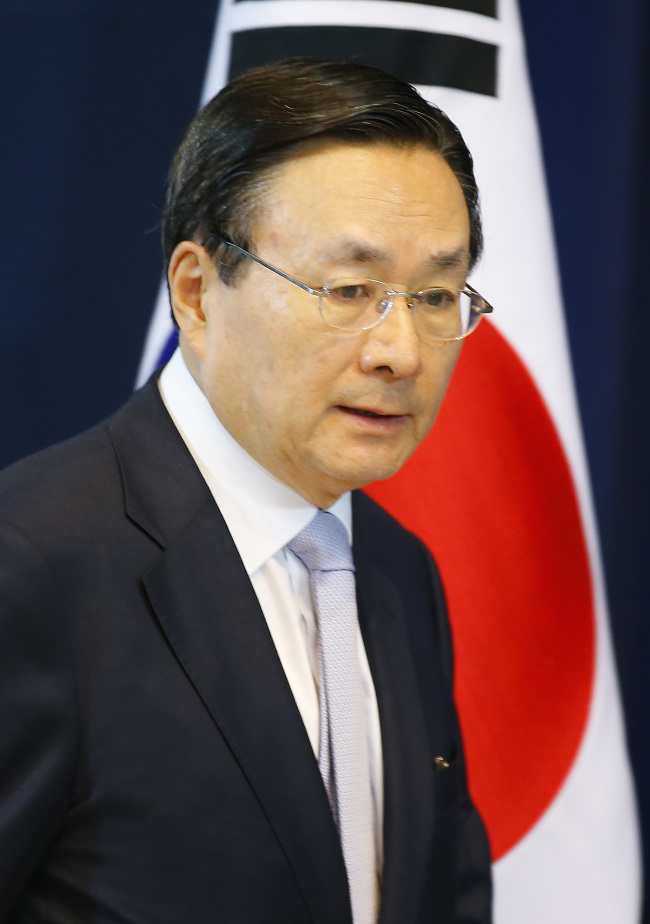President Park Geun-hye’s surprising personnel shake-up on Monday was widely seen as a move to reprimand her foreign affairs team for its failed mission to persuade the U.S. to transfer fighter jet technology to Korea.
Park named Kim Kyou-hyun, the National Security Council secretariat chief, as her new senior presidential secretary for foreign affairs and national security. Kim replaces Ju Chul-ki, who had reportedly offered to resign to take responsibility for Washington’s refusal to transfer fighter tech to Seoul last week.
 |
|
Ju Chul-ki (Yonhap) |
During a meeting held on the sidelines of Park’s trip, U.S. Defense Secretary Ashton Carter, once again, rejected a request by South Korean Defense Minister Han Min-koo to transfer key technologies for building next-generation fighter jets. The delivery of the technology was never guaranteed in the contract when U.S.-based Lockheed Martin was chosen to deliver the next-generation warplanes, although the Seoul government had not publicized the fact until recently.
Calling it a “humiliating” case, some ruling party officials blamed Park’s foreign affairs team including Ju, saying he failed to set a proper strategy before Han brought up the case in Washington.
Pressure mounted on Ju after reports that he even dragged his feet to report the case to the president in June, after he learned from Seoul’s arms buyer, the Defense Acquisition Program Administration, that Washington had already rejected its call two months earlier.
The case was left unresolved until an opposition lawmaker brought it up during a parliamentary audit session. It was later found that the president was not informed. As Park’s discipline team initiated an internal probe prior to her trip to Washington, Ju was said to have offered to step down to take responsibility.
Speculations have also been growing that Park was considering replacing her entire foreign affairs team including Foreign Minister Yun Byung-se and Defense Minister Han.
Han came under criticism for revealing his intention to request the tech transfer to Washington before accompanying Park on her U.S. trip. Yun, Park’s first foreign minister, is also facing attacks that he failed to coordinate her foreign policies with related ministries and offices. Despite the growing criticism, Park’s reshuffle excluded Han and Yun.
Ju has been leading Park’s foreign affairs team since she took office in early 2013. Starting his career as a diplomat since 1972, he served key posts in the Ministry of Foreign Affairs before he joined Park’s presidential campaign in 2012. Before taking the top senior secretary post, he served as South Korean ambassador to Morocco and France.
The former career diplomat is one of the longest-serving senior secretaries who stood by Park for nearly three years. But he has been under constant pressure to resign from opponents questioning his role and capacity in tactfully mediating Park’s bold policies on North Korea and regional security.
Known as a man of mild temper, Ju has been considered feeble-minded to question or suggest diplomatic alternatives to the president at times of tension on the Korean Peninsula and tangled relationship with neighboring countries.
Kim Kyou-hyun is a career diplomat with expertise on the U.S. Known for his quiet demeanor and being a strategist, he has also been dispatched to the Defense Ministry. He was chosen as the first vice foreign minister upon Park’s inauguration and moved to the NSO in February last year, dealing with North Korean matters.
Cho Tae-yong is known for his gentle and balanced delivery and has served in key posts in the Foreign Ministry dealing with the U.S. and North Korea’s nuclear program.
He was deputy representative when the historical Sept. 19 Joint Statement was adopted in 2005 and has served as the chief six-party talks negotiator from 2013 to last year when he was promoted to the first vice minister.
By Cho Chung-un (christory@heraldcorp.com)

